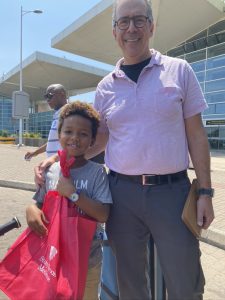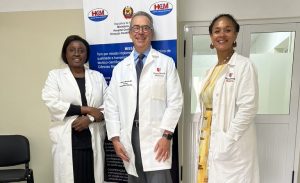People of the Year: ‘A leader among leaders,’ SBM’s Dr. William Wertheim excels as officer in charge, doctor, baker
By Daniel Dunaief
When Dr. William Wertheim visited Mozambique, where Stony Brook University has created the Global Health Institute, he was on a boat that got stranded in low tide.
The convivial and supportive Wertheim, who is Executive Vice President for Stony Brook Medicine, immediately climbed out of the boat and helped push it closer to shore, waiting for the tide to come in.

“When he was out on the Indian Ocean with some fisherman, myself and my eight-year-old son, he was very quick to roll up his sleeves and start pushing the boat ashore,” said Dr. Sierra Washington, the director of the Stony Brook Center for Global Health Equity.
Indeed, Washington suggested that pushing the boat forward became a theme for Wertheim’s visit.
TBR News Media is pleased to recognize Wertheim as a person of the year for his leadership, his deep listening skills and his ongoing commitment to the university and the surrounding communities.
For a few weeks in the spring, Wertheim’s roles and titles changed, even if the manner and his focus did not.
In June, former SBU President Maurie McInnis named Wertheim executive vice president for Stony Brook Medicine, as he shed the interim label he had taken on starting the previous October.
A few weeks later, Wertheim effectively took over for McInnis, who resigned after four years to become president of her alma mater, Yale University, when he became officer-in-charge at Stony Brook University.
“Having Wertheim named as officer-in-charge gave everybody a sigh of relief,” said Dr. Todd Griffin, vice dean for clinical affairs and vice president for clinical services.
Justin Fincher, interim chief deputy to the president and senior vice president of government and community relations, said that Wertheim, who has been at Stony Brook for 28 years, “is the epitome of the university citizen. He’s the person we all think about as a leader among leaders.”
While Wertheim was in charge of the university for about six weeks until current Interim President Richard McCormick arrived in August, he supported leadership across the campus, offering to listen or provide advice.
“He was trusting the team in place to lead,” said Fincher. “He takes his ethic of care from his training as a medical doctor and applies that in every setting and in every decision.”
Indeed, first and foremost among Wertheim’s many responsibilities and roles, he continues to serve as a practicing physician with several hundred patients.
Finding the time to see patients requires taking some extra hours. He also relies on support from other physicians and nurse practitioners who work as a team whenever he is unavailable to see his patients.
“Seeing patients is at the core of what I do,” said Wertheim. “I did go to medical school for a reason.”
A graduate of Harvard University, Wertheim earned his medical degree from New York University School of Medicine.
Through his medical practice, Wertheim not only helps the patients who come see him, but also recognizes and can offer solutions to challenges patients or doctors face.
“It’s one thing to hear about a problem, but another thing to have that sense that this really does affect what happens, when you’re going through the care of patients,” Wertheim said.
This year, doctors had trouble setting up appointments in one particular department, and Wertheim struggled to schedule appointments for his patients. Griffin, one of the senior leaders on Wertheim’s team, was able to assess the challenges for doctors in seeing new and follow-up patients. Under the guidance, nurse practitioners now see follow-up patients. This change cut the delay time in half in under a year.
Pulling in the same direction
Griffin has known Wertheim for 25 years and appreciates the way Wertheim has brought various efforts and initiatives together.

“We are a number of different entities: the hospital, the school, physician practices,” said Griffin, suggesting that Wertheim helps all those people “pull the oars in the same direction.”
One of Wertheim’s directives that has been particularly effective involved developing a new governance structure for Stony Brook Medicine. Whereas groups had been creating strategic plans for one year, Wertheim asked them to develop a three- and five-year plan.
Wertheim also unified service lines, combining such areas as ambulatory care and hospital expertise.
By understanding how patients transition from ambulatory to hospital care, Stony Brook Medicine can ensure a smoother and more patient-centric experience.
As a leader, Wertheim makes a concerted and ongoing effort to interact with staff throughout the system, including medical assistants, front-desk representatives and janitors, to name a few.
“All those people in those services get to see him and know him,” said Griffin. “He’s not some leader in an ivory tower.”
Role reversal
Wertheim was a vice dean of the medical school a few years ago when Dr. Peter Igarashi, dean of the Renaissance School of Medicine, first arrived.
“He worked for me,” Igarashi said. “I now work for him. There’s a lesson there about be careful how you treat people who work for you.”
Igarashi is delighted that Wertheim supports the work he and others do throughout Stony Brook Medicine.
After Wertheim became interim executive vice president, he visited several clinical sites and met personally with providers.
Through these interactions, Wertheim has built “authentic personal relationships,” Igarashi said.
As a primary-care physician, Wertheim has also communicated effectively to residents and students about the importance of having a fundamental foundation of excellence.
Igarashi, who is a physician researcher, values the complementary nature of Wertheim’s strength as a clinician and educator.
Wertheim “makes it easier for us to bring the benefits from a research discovery or research program to the clinical setting so patients have access to the latest expertise,” Igarashi added.
Carol Gomes, chief executive officer/chief operating officer of Stony Brook University Hospital, has worked with Wertheim for over 20 years. She never feels like “I’m reporting to him. He always says I’m his partner.”
Dr. Bill
In addition to connecting with medical professionals, Wertheim has an ability to connect with people of different ages and in different stages of life.
When he was in Mozambique, Wertheim lived with Washington and her son Malachi, who called him “Dr. Bill.”
Wertheim was “like one of the family,” said Washington. “He’s very down to Earth and was just as easily able to have a stimulating conversation with my son as with hospital directors.”
During his visit, Wertheim and Malachi both shared their passion for the Mets.
Wertheim has been a “great ally” to the Center for Global Health Equity, Washington said, and is always available to discuss core strategic planning.
Wertheim recognized that the limitations on health care workers in Mozambique had less to do with their knowledge and skills than with supplies.
“What they lack are resources,” said Wertheim.
A talented baker
At Harvard, where he was a history and literature major, Wertheim wrote his thesis on the influence of the philosophy of William James on the literature of Robert Penn Warren, author of “All the King’s Men.”
The first time Wertheim read the book, he was on a plane flying to St. Louis. He recalls reading the first chapter, which described the governor’s driver maneuvering down a highway.
“The description is so brilliant, I paused and looked out the window and realized that I was flying over the country that was not dissimilar from what he was describing. It was an incredibly powerful moment,” he said.
As if all of his skills weren’t enough, Wertheim, who is the fifth of five brothers, is also a passionate baker.
“I’m of an age where the kitchen might have been thought of as a place for girls or women,” Wertheim said. “That wasn’t the case in my house.”
He made several mistakes, particularly with his sourdough bread, but has learned from those earlier experiences.
“It’s fun and relaxing,” Wertheim said. “When you spend a lot of time thinking about very serious things, it can be gratifying to focus in on a small task” such as kneading dough.
Gomes recalled recently receiving a croissant. She loved the “very buttery” taste.
Griffin sees overlaps between Wertheim’s medical duties and his baking abilities.
“The precision needed, following recipes being detail oriented, having the patience to bake and make it come out the way you want” is also evidence in how “careful and precise [Wertheim] is in how he engages with others. Big complicated things don’t happen overnight. He’s methodically and carefully putting down the ingredients.







